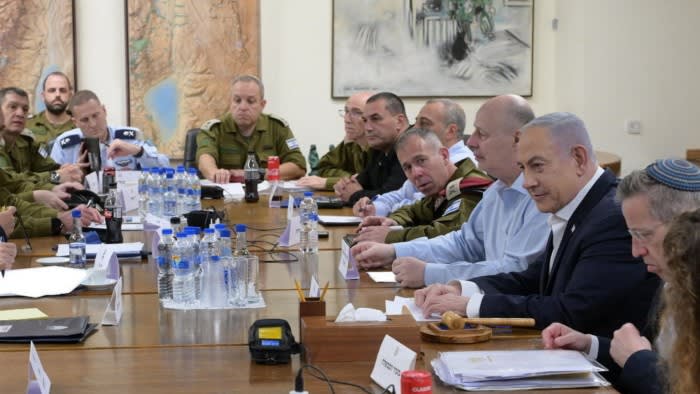Unlock the Editor’s Digest for free
Roula Khalaf, Editor of the FT, selects her favourite stories in this weekly newsletter.
Western leaders increased pressure on Israel on Monday to exercise restraint following Iran’s drone and missile attack, as Benjamin Netanyahu’s war cabinet prepared to reconvene to discuss how it will respond.
French President Emmanuel Macron said the international community should do “everything we can to avoid flare-ups” and “try to convince Israel that we shouldn’t respond by escalating, but rather by isolating Iran”.
The British foreign secretary, Lord David Cameron, said the UK had made clear that it would not take part in any retaliatory strike.
He echoed US President Joe Biden’s call for Israel to “take the win” after the Jewish state and its allies downed almost all the projectiles fired at the country by Iran and its proxies on Saturday.
“We’re saying very strongly that we don’t support a retaliatory strike. We don’t think they should make one,” Cameron said in an interview with the BBC’s Today programme.
He argued that Israel should instead redouble its efforts to release the 134 hostages still held by Hamas in Gaza.
“The right thing to do, the tough thing to do now, is not to escalate further but to switch the focus back on to getting the hostages home,” he added.
Macron’s and Cameron’s comments came as Israel’s five-man war cabinet was due to reconvene at 2pm local time to continue its discussions on how to respond to the Iranian barrage.
Tehran launched the attack on Saturday in retaliation for an Israeli strike on its consulate in Damascus this month that killed several senior Iranian commanders.
A person familiar with the discussions told the Financial Times on Sunday it was clear that Israel would respond to the Iranian barrage but added the cabinet had yet to decide on the scale and timing of the response.
Iran’s salvo was the first time it had attacked Israel directly from its own territory and brought the Middle East closer to a full-blown war between its two strongest military powers.
The region has been engulfed by hostilities since the conflict between Israel and Hamas erupted last year.
An Israeli military official said that the scale of the barrage, which involved 170 drones, 30 cruise missiles and 120 ballistic missiles, was escalatory and that the military had presented a range of possible responses to the Israeli leadership.
Hardliners in Netanyahu’s coalition with ultrareligious and far-right groups have demanded a “crushing” response to the Iranian attack.
However, others have argued that the relatively limited impact of the strikes, which seriously injured a young girl and caused minor damage to two military bases, meant that Israel could afford to adopt a more measured response.
Benny Gantz, a former general and opposition politician who joined Netanyahu’s war cabinet after the outbreak of the war with Hamas last year, said on Sunday that Israel would respond “in the way and at the time that suits us”.
He added that Israel should take advantage of the fact that several other countries, including the US, UK, France and Jordan, had helped it to down the Iranian barrage.
“Yesterday the world clearly stood together with Israel in the face of the danger . . . This is a strategic achievement, which we must leverage for Israel’s security,” he said.
“This event is not over — the strategic alliance and regional co-operation system that we built and stood its significant test needs to be strengthened right now,” he added.
Gantz also said Israel should not let the confrontation with Iran distract it from its war with Hamas in Gaza, and its attempts to force the Iran-backed militant group Hizbollah back from its northern border with Lebanon.
“We must remember that we have not yet completed our tasks — primarily the return of the hostages and the removal of the threat from the residents of the north and south,” he said.
The Israeli military said on Sunday night it was calling up two brigades of reservists “for operational activities on the Gazan front”.
Israel has pledged to launch an operation in Rafah, which it regards as Hamas’s last stronghold in Gaza. But it has been under intense pressure from the US not to carry out an operation in the city without evacuating the more than 1mn Palestinians who are sheltering there after fleeing fighting elsewhere in the enclave.
The Kremlin said on Monday it was “extremely concerned by the escalations of tension in the region” after Iran’s attack on Israel.
Dmitry Peskov, President Vladimir Putin’s spokesman, said Russia called on “all countries in the region to show restraint” and solve the conflict diplomatically. “Further escalation is in nobody’s interest,” he said.
Russia’s foreign ministry earlier said Iran had the “right to defend itself” following an Israeli strike on its embassy in Syria.
Additional reporting by Max Seddon in Riga
